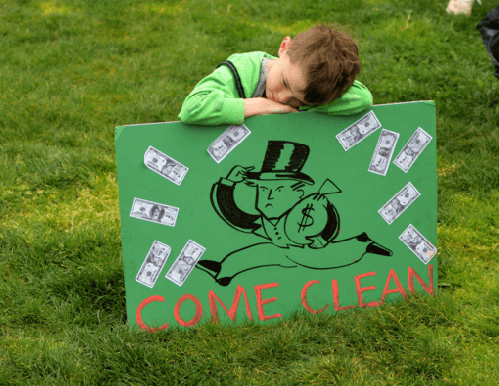From Counterpunch
The Earth doesn't quite shake when lawmakers in Washington, D.C. take one of their periodic votes on tax "reform." But sometimes history does turn, and this coming week's expected vote on the Senate version of the GOP tax plan could be one of those rare times that history actually turns for the better.
Indeed, this year's situation bears a remarkable resemblance to the epic tax battle of 1932, a largely forgotten struggle that set the stage for an entire generation of increasing equality. Could this history repeat? It certainly is already echoing.
Back in 1932, just as today, conservatives had a lockgrip on the White House and both houses of Congress. Then as now, America's wealthy lusted for fundamental tax changes that would significantly reduce their already reduced tax burden. Then as now, those wealthy -- and the pols they subsidized -- framed tax breaks for the rich as our only road to prosperity.
That prosperity seemed incredibly distant in early 1932. The nation had sunk into the Great Depression, and the federal government was collecting far too little revenue from a Depression-ravaged economy to function. The government, nearly everyone understood, simply had to raise more revenue. But the new revenue the government so desperately needed, top Republicans and Democrats in Washington agreed, must not come from the rich.
In November 1931, Democratic Senate floor leader Joseph Robinson from Arkansas had driven that consensus home with comments the Washington Post called "so conservative as to sound like a statement from Secretary of the Treasury Andrew Mellon," the mega-millionaire who spent the 1920s orchestrating tax cuts that sheared the top tax rate on America's highest incomes from 77 to 25 percent. Robinson warned the American people against any move that might subject the nation's wealthy to significant new taxation. Serious people all agreed, the Senate's top Democrat would explain, that the government could only tax the rich so high "without discouraging investment and production."
Democrat John Nance Garner from Texas, the House speaker, would pound home the same theme the next month. He delivered what the Los Angeles Times Washington correspondent would dub a "mild spanking" to his Democratic Party colleagues who had had the nerve to suggest boosting tax rates on high incomes back near World War I levels.
A few weeks later, another leading Democrat, acting House Ways and Means Committee chairman Charles Crisp of Georgia, would continue the spanking. The nation could never meet its fiscal emergency by "soaking the rich," Crisp informed his colleagues. Average Americans will have to "gird" themselves for "tremendous sacrifices." A national sales tax, or some other tax that demanded "stamina" and "backbone" from all Americans, was going to have to be levied.
The Herbert Hoover White House agreed, in part. Administration officials would ask Congress to enact higher federal excise taxes on many everyday purchases, everything from tobacco to telephone calls. But the Republican Hoover administration would not go along with a national sales tax. Undersecretary of the Treasury Ogden Mills, soon to become treasury secretary after Andrew Mellon resigned to become America's ambassador to Great Britain, asked Congress instead to up the nation's top income bracket tax rate from 25 to 40 percent.
What explains this White House willingness to contemplate slightly higher tax levies on America's comfortable? Hoover may have considered a little political discretion here the better part of valor. Better a modest tax increase on the wealthy than risk the unpredictable popular wrath a national sales tax might unleash.
Republican and Democratic leaders in Congress had no such fears. The heat they felt came from newspaper publisher William Randolph Hearst, the powerful media magnate who had emerged as the national sales tax notion's most fervent advocate.
Hearst had no particular philosophical affection for taxing sales. Neither did any of his fellow wealthy Americans. They simply wanted Congress to put in place an alternative to taxing income. Their income. Americans, Hearst wrote in a nationally circulated March 1932 editorial, must "carry on a sustained crusade Morning, Evening, and Sunday against the present Bolshevist system of income taxation."
The Democratic Party majority on the House Ways and Means Committee would obediently oblige. Lawmakers on the panel repudiated the Hoover administration and nixed any income tax hike. They passed instead an almost all-encompassing national sales tax, a 2.25 percent manufacturer's excise levy on everything but food.
What happened next would floor top Democrats and their calculated bid to position the party as a reliable partner for America's rich and powerful. Powerful Democrats -- like the Wall Street financier Jacob Raskob -- had simply gone too far. Americans would push back. They would mount the first national political surge against plutocracy since the Great Depression began.
The surge broke out almost as a matter of spontaneous political combustion. From across the nation, average Americans began bombarding congressional offices with angry complaints about the pending new national sales tax. In the face of this surprise bombardment, rank-and-file Democrats in Congress would suddenly rediscover their inner displeasure at America's staggering concentration of income and wealth. They would join with Representative Fiorello LaGuardia from New York and other progressive House Republicans to kill the national sales tax by a stunning 223-153 margin.
(Note: You can view every article as one long page if you sign up as an Advocate Member, or higher).





